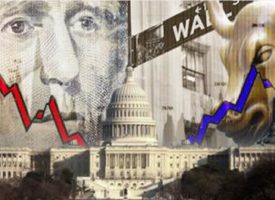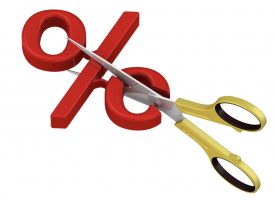As we continue to kickoff trading in the month of October, this global ticking time bomb is about to be unleashed which could make this October one to remember.
October 2 (King World News) – Gerald Celente: The amount of money owed by governments, businesses, households, and individuals grew by $10 trillion in this year’s first half to a record $307 trillion, the Institute of International Finance (IIF) said in a 19 September report.
France, Japan, the U.K., and the U.S. led borrowing increases among developed nations, the sector responsible for 80 percent of the new debt. Brazil, China, and India—the three largest emerging economies—were the heaviest borrowers among that group.
Global debt has added $100 trillion—almost a third of the current total—since 2012, the report said.
In this year’s second quarter, the ratio of global debt to global GDP rose to 336 percent, up 2 percent during the year’s first half. It was the second consecutive quarterly increase; before that, the ratio had been shrinking for seven quarters.
However, the ratio is still below the 360-percent peak reached during the COVID War.
“The sudden rise in inflation was the main factor behind the sharp decline in debt ratio over the past two years,” the IIF’s report noted.
Also, governments have increased their spending commitments, from defense to stimulating national economies to financing the energy transition.
Now that inflation and wage increases are slowing, debt to GDP likely will grow past 337 percent before 2024, it predicted, as existing debt is refinanced at current higher interest rates.
Also, interest rates in many countries are expected to remain high into next year to ensure inflation’s demise…
ALERT:
Legendary investors are buying share of a company very few people know about. To find out which company CLICK HERE OR ON THE IMAGE BELOW.
 Sponsored
Sponsored
“As higher rates and higher debt levels push government interest expenses higher, domestic debt strains are set to increase,” the IIF said.
“Our concern is that countries will have to allocate more and more to interest expenses,” Emre Tiftik, the study’s primary author, said in a statement accompanying the report’s release. “It will have long-term implications for countries’ funding costs and debt dynamics.”
“Rising interest bills are a key risk to public finances and sovereign [credit] ratings,” Edward Parker, managing director at Fitch Ratings, said in a statement regarding the rising debt.
Fitch downgraded the U.S.’s creditworthiness earlier this year as debts mounted and the Congress indulged in prolonged haggling over conditions for raising the national debt ceiling before narrowly averting a government default.
Household debt-to-GDP ratios in emerging nations remain above pre-COVID-19 levels, largely due to borrowing by individuals in China, Korea, and Thailand, the study found. In contrast, the ratio in mature economies shrank to its smallest in two decades in this year’s first half.
“Should inflationary pressures persist in mature markets, the health of household balance sheets, particularly in the U.S., would provide a cushion..against further rate hikes,” the report noted.
TRENDPOST:
The global debt is a ticking time bomb.
As governments continue to borrow, a greater and greater share of their budgets will have to be used to pay interest on debts. The alternatives, both bad, are to keep raising taxes or keep cutting spending on education, social services, business development, and other desirable programs. Unless stopped, mounting debt eventually will cut into spending on infrastructure and other essential budget items.
Government debt also leaves less money that industrialized nations can invest in emerging markets, a circumstance that can leave hundreds of millions of people in poverty longer.
Households, particularly in the U.S., Europe, and China—where household debt has now reached a record level, according to the South China Morning Post—are using savings and credit cards to meet basic expenses. That is not a permanent solution.
The debt crisis overshadows inflation—yet, while analysts and policymakers fret over rising prices, there is no similarly strong focus on controlling spending.
Without a plan to gradually reduce spending—by governments, businesses, and households—the debt bomb will explode, with unpredictable consequences for individuals, governments, and social and political stability the world over.
TREND FORECAST:
Repeating what we have long forecast, today, Wolfe Research chief investment strategist Chris Senyek told CNBC that the “Wall of corporate debt refinance starting in 2024 is another stock market headwind,” and that ‘“Refi’s are going to become a much bigger factor next year,” Senyek said in a note Tuesday. “[T]hat higher interest expense is likely to create a $5-$7/share headwind for S&P 500 operating EPS in 2024.”
Wolfe included a table showing $903 billion in U.S. corporate debt (excluding financial companies) coming due in 2024, up 343 percent from $204 billion in 2023. “That rises another 42 percent in 2025 to $1.28 trillion and 15 percent in 2026 to $1.47 trillion, before starting to come down.”
Again, making a bad debt bomb even worse is the Office Building Bust as building owners will not be able to pay off their debt or refinance it at higher interest rates as office tenants abandon buildings and/or lease less space as a result of the work-at-home trend brought to the world by the COVID War.
ALSO JUST RELEASED: Global Markets Still Nervous As Government Shutdown Looms, Plus “Rent (Still) Too Damn High” CLICK HERE
ALSO JUST RELEASED: IMPORTANT UPDATE: Gold, Commodities And Inflation CLICK HERE.
To listen to Gerald Celente discuss the unfolding collapse and what surprises to expect next CLICK HERE OR ON THE IMAGE BELOW.
Just Released!
To listen to Alasdair Macleod discuss the financial crisis that is about to erupt and what this will mean for gold and silver CLICK HERE OR ON THE IMAGE BELOW.
© 2023 by King World News®. All Rights Reserved. This material may not be published, broadcast, rewritten, or redistributed. However, linking directly to the articles is permitted and encouraged.









